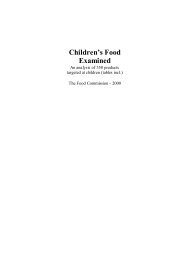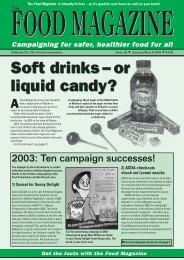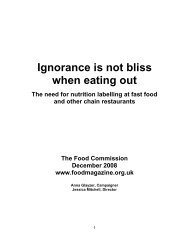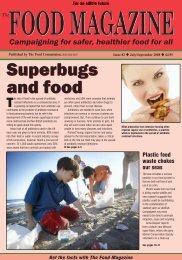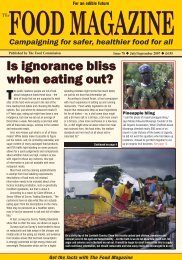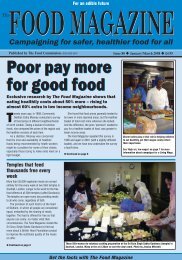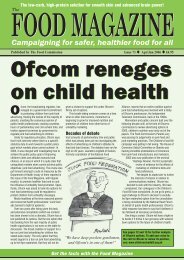Children's Nutrition Action Plan - The Food Commission
Children's Nutrition Action Plan - The Food Commission
Children's Nutrition Action Plan - The Food Commission
Create successful ePaper yourself
Turn your PDF publications into a flip-book with our unique Google optimized e-Paper software.
Professor Aubrey Sheiham<br />
<strong>Action</strong> and Information on Sugars<br />
Sugars and oral health<br />
Sugar is the litmus test of how the food industry works. If we are to challenge the current<br />
food culture, we must be much more sophisticated – both politically and scientifically – in<br />
our arguments and campaign work to improve children’s nutrition.<br />
In the Eurodiet debate, the food industry was represented by, among others, professors<br />
funded by the food industry, who helped to change the official dietary recommendations on<br />
sugar. <strong>The</strong> claim was that if children ate less sugar they would eat more fat, the so-called<br />
fat/sugar seesaw which has little scientific validity.<br />
One of our strongest arguments for reducing consumption of sugars is that if children eat high<br />
levels of sugary foods, they will eat fewer vitamins and minerals. <strong>The</strong> effect will be nutrient<br />
dilution.<br />
<strong>The</strong> relationship between sugars and dental health is one of the strongest relationships for any<br />
nutrient and disease. <strong>The</strong> approach we should adopt is one common to food and health policy:<br />
intervening at different points in the food chain. For example, changing the sugar supply in<br />
children’s diets by formulating dietary guidelines for nurseries, schools, and for those in care,<br />
as has been done by the Caroline Walker Trust. This might mean giving less sugar to cooks in<br />
schools, which would lead to less sugar in the children’s diets, leading to less tooth decay.<br />
<strong>The</strong> positive effects of this approach have been shown in nurseries in Brazil. This kind of<br />
intervention could also be introduced in schools in the Health Promoting Schools scheme –<br />
incorporating nutrition into the criteria used to judge schools with progressive health policies.<br />
References<br />
• Caroline Walker Trust (1995) Eating well for older people. London: CWT.<br />
• Caroline Walker Trust (1998) Eating well for under-5s in childcare. London: CWT.<br />
• Caroline Walker Trust (2001) Eating well for looked-after children and young people. London: CWT.<br />
• Rodrigues, C. S.; Watt, R. G.; Sheiham, A. Effects of dietary guidelines on sugar intake and dental caries in<br />
3-year olds attending nurseries in Brazil. Health Promotion International 1999:14; 329-335.<br />
Department of Epidemiology and Public Health, University College London Medical School,<br />
1-19 Torrington Place, London WC1E 6BT.<br />
<strong>The</strong> Children’s <strong>Nutrition</strong> <strong>Action</strong> <strong>Plan</strong>, published by <strong>The</strong> <strong>Food</strong> <strong>Commission</strong><br />
29



